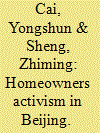| Srl | Item |
| 1 |
ID:
124637


|
|
|
|
|
| Publication |
2013.
|
| Summary/Abstract |
It is commonly accepted that leaders play a crucial role in collective action. Existing literature has suggested a number of factors that contribute to the emergence of leaders including, among others, personality, sense of moral responsibility, community pressure, self-interest and institutional exclusion. However, current research tends to suggest that activists are driven by a particular reason to become leaders and that their motivation is static. Based on intensive fieldwork in residential communities in Beijing, this article illustrates that leaders' motivations can be mixed or multiple and that leaders may re-prioritize or adjust their objectives over the course of collective action. The re-prioritizing tends to alter the leaders' behaviour and affect group solidarity and interactions with other group members.
|
|
|
|
|
|
|
|
|
|
|
|
|
|
|
|
| 2 |
ID:
166457


|
|
|
|
|
| Summary/Abstract |
The housing stock has a considerable share of 40% in energy consumption and 36% of emissions in the EU. In accordance to energy efficiency and emissions targets set by EU, The Netherlands has aimed to renovate 300,000 homes each year, leading to 50% reduction in emissions, by 2050. Many factors including low renovation rates create uncertainties in achieving these targets. The current study aims for understanding the barriers and drivers towards energy efficiency renovations (EERs) amongst Dutch homeowners, and to aid in gaining a better insight into the role of public authorities in promoting EERs. First, the extrinsic drivers, including policies and other initiatives in the EER process are explained. Second, the intrinsic drivers and intrinsic/extrinsic barriers are explored. Regression analyses are performed on the national Dutch survey data for renovators and potential renovators. Our main findings include: (a) desire to enhance the quality of their life, rather than the financial benefits, etc. is identified as the main driver; (b) the main barriers are the costs of EERs, complexities in the process, information barriers, and finding reliable experts and information; (c) For improvement in meeting renovation targets, the current Dutch policies need to consider all the decision criteria by homeowners, such as: Reducing the complexities; Time needed to obtain loans and subsidies; and Facilitating access to information.
|
|
|
|
|
|
|
|
|
|
|
|
|
|
|
|